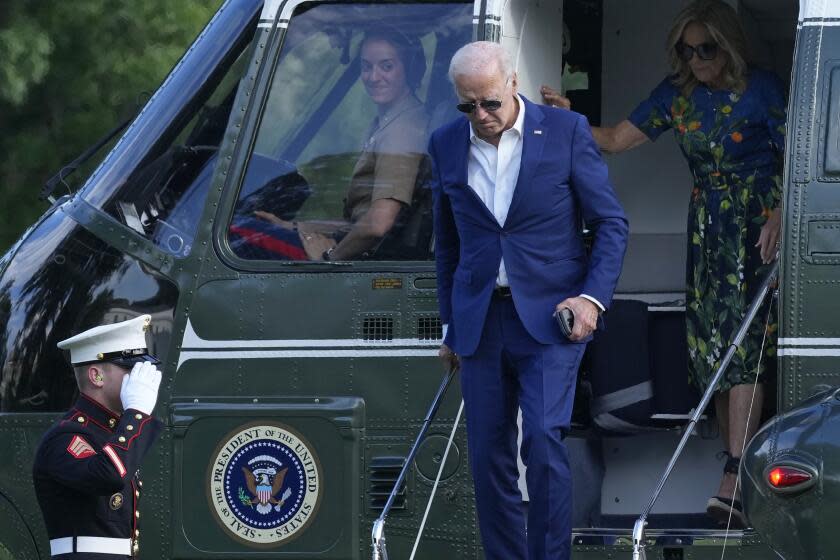Biden's fate dominates global stage at NATO summit

Leaders from 32 countries are gathering in Washington for NATO's 75th anniversary summit, but all eyes are on just one: President Biden.
With questions circulating over his mental and physical fitness to run for reelection, Biden will now be tested on a world stage.
At stake is not just Biden's presidency but, potentially, the future of the transatlantic alliance that has kept relative peace in a large part of the world for more than half a century.
Formally opening the summit Tuesday evening on a stage festooned with the flags of 32 countries and heralded by military trumpeters, Biden seemed in relatively good form.
"Our friends, we are stronger than ever," Biden said, announcing what he called a "historic donation" of air defense systems for Ukraine.
"The fact that NATO remains the bulwark of global security did not happen by accident," he said. "Again and again we chose unity."
Biden has long prided himself on his skills in dealing with world leaders. And he will surely use the summit to emphasize what some analysts consider his finest foreign policy achievement: the unity forged among NATO members to support and aid Ukraine in its devastating war with an invading Russia.
Most leaders attending this annual meeting of the North Atlantic Treaty Organization are expected to praise Biden and his efforts.
Publicly, they will not criticize him. But the "Biden question" looms over the crowded, heavily guarded venues where they are gathering.
Privately, diplomats say, several foreign officials have expressed concerns about Biden's perceived frailties, citing occasional lapses in bilateral meetings or apparently confused statements.
For some, the issue is practically existential: If Biden loses to Donald Trump, a convicted felon who has harshly criticized NATO, the central transatlantic mutual defense pact that has governed world order since World War II may be in danger.
Trump has derisively dismissed the importance of NATO while showing deference toward and admiration of Russian President Vladimir Putin.
Administration officials dismiss any concerns among the mostly European leaders about Biden.
"Look, foreign leaders have seen Joe Biden up close and personal for the last three years," a senior administration official said, briefing reporters on condition of anonymity ahead of the summit. "They know who they’re dealing with, and, you know, they know how effective he’s been."
The White House takes credit for the expansion of NATO, with the decision by Finland and long-neutral Sweden to join the alliance following Russia's 2022 invasion of Ukraine.
"That's not be accident," said John F. Kirby, White House national security spokesman. "That’s because of leadership. That’s because of a constant stewardship of the alliance and other partnerships around the world. The president's record speaks for itself."
Still, it may not be easy for the presidents and prime ministers filing into the historic neoclassical Andrew Mellon Auditorium on Constitution Avenue — where the NATO treaty was signed 75 years ago — to ignore the goings-on a mile and a half across town where Democrats were meeting to debate Biden's fate.
Rep. Adam Smith of Washington state is one of a handful of Democratic lawmakers who have publicly called for Biden to withdraw from the presidential race. "He can no longer deliver the message" of strength through leadership, he said.
Most Republicans seemed content to let the Democrats squirm.
Sen. John Cornyn (R-Texas) seized the moment to warn of "weakness" before NATO.
"This week, President Biden has one job to do, and that's to deliver a clear and powerful message to our allies," he said. “I hope President Biden can summon up the energy, and the forcefulness, and the ability to express this important message to our friends and allies around the world because our adversaries are watching, but so are our friends."
And at the White House, Press Secretary Karine Jean-Pierre spent a second day fending off questions about Biden's health. "Is he being treated for Parkinson's?" "Is he taking medication for Parkinson's?" No to both, she said.
Ian Bremmer, president of the Eurasia Group, which studies global risks, said Tuesday that his survey of world leaders in town for the summit revealed a near universal loss of confidence in Biden's ability to serve another four-year term.
"It's not that they don't like him," he said on MSNBC. "They don't think he's up for the job."
Biden's stamina will be tested Thursday when he has scheduled a rare, solo news conference for 5:30 p.m. Eastern time — following a day of back-to-back meetings with a long list of NATO members.
Speaking Monday to the "Morning Joe" show, Biden struck a defiant tone about his election prospects. "Who else — who else — do you think could step in? And do this?" he said. "I expanded NATO!"
This story originally appeared in Los Angeles Times.


